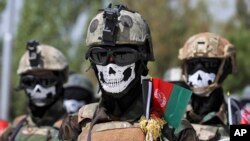Some former members of Afghanistan’s special forces who fled to Iran after the Taliban’s takeover in Afghanistan are now being recruited to fight for Russia in Ukraine and for Iran in Yemen, two former senior Afghan security officials told VOA.
The former Afghan army chief, General Haibatullah Alizai, said Tehran is using the vulnerability of former Afghan forces now living in the country to recruit them to strengthen the ranks of Houthi rebels in Yemen.
“When former Afghan military members go to immigration bureaus in Iran to extend their visas, they are told to go to Yemen to fight in support of the Houthis,” Alizai told VOA.
Mohammad Farid Ahmadi, the former commander of Afghanistan's elite National Army Commando Corps, told VOA that former Afghan special forces now are engaged in “six critical areas” of the world: Nagorno-Karabakh, Ukraine, Yemen, Iran, Syria and Russia, but “in small groups.”
Afghan commandos who were trained by the U.S. and NATO are considered the most experienced former military personnel in Afghanistan. Before the fall of Afghanistan to the Taliban, the commandos were led most of the complex combat operations throughout the country.
The Associated Press reported that Russia is now also seeking to recruit former Afghan special forces in Iran to fight alongside their military in Ukraine by offering them “$1,500-a-month payments and promises of safe havens for themselves and their families.”
Officials with the Russian embassy in Washington and Iran’s United Nations representatives have not responded to emailed questions about whether their governments are recruiting former Afghan armed forces and commandos. The Associated Press reported that Yevgeny Prigozhin, the head of the Wagner Group, dismissed claims of recruiting former Afghan soldiers as “crazy nonsense.”
But pressuring Afghans to fight is not a new tactic. In 2016, Human Rights Watch said Iran was using Afghan refugees as soldiers to fight in Syria.
Taliban threat
Former Army Commando Corps leader Ahmadi said there were about 30,000 commandos serving in Afghanistan before the Taliban took control of Kabul.
"Now a big majority of Afghan former commandos are inside Afghanistan, disguising and living in hiding,” said Ahmadi, adding that “a number of them were detained and tortured by the Taliban."
According to a report published a few months ago by the U.S. Office of the Special Inspector General for Afghanistan Reconstruction (SIGAR), former Afghan commandos who have stayed in the country have "almost certainly" joined the fledgling opposition group known as the National Resistance Front or are living in hiding out of fear of being killed or imprisoned by the Taliban.
Ahmadi said some of the former soldiers were held and tortured in Taliban prisons. But he said after tribal elders intervened, many were released after they paid money and vowed never to speak of their treatment in prison.
Ahmadi says Afghan special forces feel betrayed by the country’s former political leaders and he describes many now as "desperate, hopeless and vulnerable."
He also urged officials in Washington to try to help those Afghans who fought shoulder to shoulder with the U.S. forces for the past 20 years.
"The U.S. should fulfill its promises and not let these forces be hired as mercenaries," Ahmadi said.
Washington ‘in a difficult position’
At a Washington news briefing on October 31, State Department spokesperson Edward Price responded to questions about the recruitment of Afghan commandos by saying, “I’m aware of those reports. I’m not aware, though, that we have been in a position to confirm that such Afghan commandos have actually been enlisted into President Putin’s war.”
Rand Corporation policy researcher Jason Campbell said that limited U.S. reach in parts of Iran and Taliban-controlled Afghanistan where former Afghan commandos live puts Washington, logistically speaking, “in a difficult position.”
“It’s certainly a hard decision for the U.S. to make in terms of trying to take steps to ensure the safety of all these thousands of commandos, particularly in light of recent developments, where, as we said, certainly Russia but [also] other states might see an opportunity here to recruit some of these ... seasoned and well-trained fighters who find themselves living in desperate conditions,” Campbell said.
Bill Roggio, a senior fellow at the Washington-based Foundation for the Defense of Democracies, told VOA that the chaotic U.S. withdrawal from Afghanistan created this problem.
“This is one of the unforeseen consequences of the U.S. disastrous withdrawal from Afghanistan. We left behind tens of thousands of highly trained Afghan soldiers. These are the commandos who are quite capable. They were on the frontlines in the fight against the Taliban,” he said.
Roggio added, “Some [former Afghan commandos] have gone into Iran, but by Russia opening up the opportunity for them to possibly get Russian citizenship and telling them that you fight for us in Ukraine, we will help you and help your family. That is quite appealing.”
Lina Rozbih contributed to this report. This story originated in VOA’s Afghan service.





